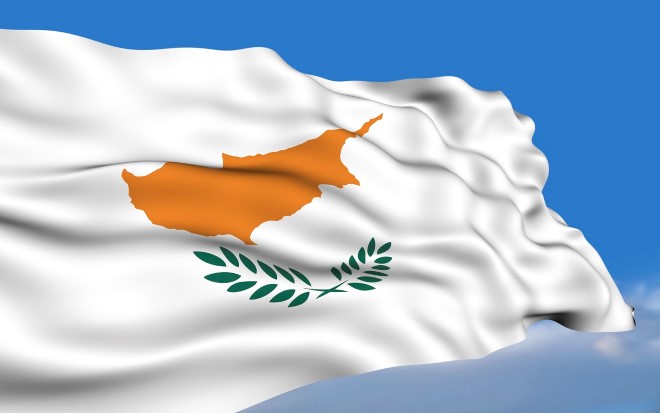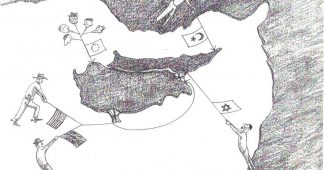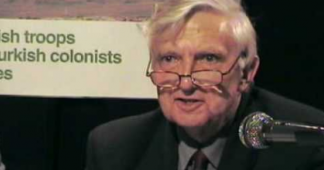By William Mallinson *
The attempted cratocide of Cyprus continues unabated, with the island’s legal inhabitants watching, mesmerised, while their current leader is apparently coming to an agreement in Crans Montana (sounds sexier than Geneva or Zurich, in PR terms), that could both cause chaos and put the final nail in the coffin prepared by the British in 1955, that led to a colonial war and then a semi-independent and meta-colonial state.
As with the so-called abortive Annan Plan negotiations, various Anglo-Saxon-, but also Brussels-sponsored, think tanks are publishing articles devoid of thought, using jejune IR terms such as ‘win-win’ and ‘window of opportunity’, while at the same time claiming that it is the last chance for a solution. This tired mantra has become a silly threat, since there have been many so-called last chances since 1963.
As Guicciardini wrote, the same things return with different colours. This is what we are now witnessing: another attempt to rejuvenate the parts of the 1960 treaties pertaining to the British Bases, and to bring back the abortive Annan Plan, albeit with new colours. Yet many of the current PR ‘actors’ are probably unaware that that it was the very 1960 treaties that caused the collapse of the constitution in the first place.
Before setting out the real background, rather than the silly PR bromides used by unknowledgeable journalists, unthinking tanks, and recent Reuters articles in Foreign Affairs,[1] implying that if the Cypriots do not approve the plan, there will instability, let us look briefly at the Annan debâcle of 2004.
First, it was used as a vehicle to push for Turkish membership of the EU, part of which it was occupying. Second, it sanctioned the Turkish occupation. Third, the majority of illegal settlers would be allowed to remain, thereby showing that the ‘plan’ set out to legalise illegality, an oxymoron if there ever was one. Fourth, it would have meant no serious foreign policy sovereignty for Cyprus since, in the case of disagreement between the de facto Turkish-controlled Turkish-speaking Moslems in Cyprus, decisions would be exported abroad. In short, were the Cypriots to approve of the plan, they would emasculate their state, whose ‘new’ agreement would have so many derogations from EU law as to make Cyprus a third-class potential de facto Turkish colony. Russia knew this, and scotched a last minute attempt by the US and UK to legitimise the whole farrago.
Let us now remind the alleged experts involved in Crans-Montana of some facts, and therefore home truths, before concluding. History can hurt ostriches.
In 1975, the Foreign and Commonwealth FCO) Office wrote:
British strategic interests in Cyprus are now minimal. Cyprus has never figured in NATO strategy and our bases there have no direct NATO role. The strategic value to us has declined sharply since our virtual withdrawal from east of Suez. This will remain the case when the Suez Canal has reopened.
Given our decision not to use military force in Cyprus and the relatively small amount of pressure that we can bring to bear on Cyprus, Greece and Turkey, this puts us in the invidious position of having responsibility without power. This has brought us no advantages whatsoever and it must be in British interests for us to work for a solution which will not involve Britain in any guarantee obligations or other lasting commitments over Cyprus. Such a solution is however remote and will be particularly difficult to achieve as long as we retain a physical presence in the Bases.[2]
More ominously, the FCO also wrote:
We should also recognise that in the final analysis Turkey must be regarded as more important to Western strategic interests than Greece and that, if risks must be run, they should be risks of further straining Greek rather than Turkish relations with the West.[3]
Another FCO quote, from 1975, shows how legally farcical the whole 1960 package is:
One implication of the current Turkish Cypriot constitutional moves, and specifically of Denktash’s confirmation to me that they regard the post of President and Vice-President as having lapsed, is the extent to which the whole 1960 Treaty apparatus be held to have lapsed […] we […] continue to regard the 1960 constitution as still in practice operative, despite the various derogations by both Greek and Turkish Cypriots since 1963. But the Turkish side is in effect saying increasingly openly and firmly that the 1960 constitution is defunct. They are, of course, freely having their cake and eating it by applying the view only when it suits them.[4]
More damningly, some days after the above was written, an FCO legal adviser wrote:
It is not, however, open to the Turkish Government to pick and choose between the various parts of the 1960 Treaty apparatus as it suits their purposes […] the Turks cannot rely on the collapse of the Constitution in order to justify intervention for the purpose of re-establishing the state of affairs established by the basic Articles of the Constitution and, having intervened with that aim, then ignore that aim because the Constitution has lapsed.[5]
A final FCO quote from before the Turkish invasion demonstrates the obvious relationship between the British bases (now NATO/American in all but name) and the legal shakiness of the ‘1960 apparatus’:
[…] The various 1960 agreements […] constituted an integral settlement, in effect a package deal. The abandonment of our position on the Treaty of Guarantee would thus undermine our position on the rest of the 1960 settlement. In particular, it might one day be found to have prejudiced our position on the Treaty of Establishment as well. c) Even though our title to the Sovereign Base Areas does not depend on the Treaty of Guarantee or the Treaty of Establishment, the express provisions in those Treaties concerning the Sovereign Base Areas may still be of value to us in ensuring our untroubled occupation and use of the Areas. Moreover, anything which called the 1960 settlement as a whole into question could expose us to pressure on our moral (as distinct from legal right to hang on to the Areas. d) Whether or not we have a direct interest in maintaining the Treaty of Guarantee, we could not openly abandon it without gravely upsetting Turkey.[6]
The same things return with different colours. It is clear that the Zurich agreements and the resulting ‘treaties’ were at best built on very shaky legal foundations, and at worst were actually illegal, as began to be recognised after 1963. Not to mention the ethics of the case!
A few more facts might focus minds: in 1955, Britain decided to involve Turkey in Cyprus, illegally, since Article Sixteen of the Treaty of Lausanne forbade Turkey from involvement in former Ottoman possessions. Britain’s aim was to cause Greek-Turkish friction, so as to maintain her sovereignty. It would only be a question of time until Turkey invaded.
Second, Britain colluded secretly with Turkey.
Third, when the US took over the Middle East from Britain, it pressurised Britain into negotiations, in order to keep at least the Cyprus British bases in a NATO-friendly solution.
Fourth, the whole ‘solution’ was predicated on keeping the Soviet Union out of the strategic game, rather than on the interests of the people of Cyprus.
Fifth, the whole package of treaties that set up the pseudo-independent republic was predicated on the British bases. The Foreign Office even recognised the illegality of the Treaty of Guarantee, in that it breached Article 2.4 of the United Nations Charter, and was overridden by virtue of Article 103 of the Charter.[7]
Sixth, as early as 1964, the Foreign Office was writing that in the long term, Britain’s sovereign rights would be considered increasingly irksome by the Greek Cypriots and would be regarded as increasingly anachronistic by world public opinion.
Seventh, by 1976, the FCO was writing that British policy should be one of complete withdrawal of a military presence from Cyprus, and that this would have to take into account the need to transfer sovereignty to the government of Cyprus.
Eighth, the US then offered to pay for the bases, and negotiations on this began.
Ninth, Kissinger had already written to the Foreign Minister, Callaghan, that Britain should retain its bases, citing the Soviet Union. The FCO also referred to Kissinger’s description of Cyprus as an important piece of the world chessboard, and important in the Arab/Israel dispute. To Kissinger Cyprus was a piece of real estate and nothing more.
Tenth, by 1980, with a Thatcher government, in an about-turn, the FCO wrote that ‘the benefits which we derive from the SBAs are of major significance and virtually irreplaceable. They are an essential contribution to the Anglo-American relationship. The Department have regularly considered with those concerned which circumstances in Cyprus are most conducive to our retaining unfettered use of our SBA facilities. On balance, the conclusion is that an early ‘solution’ might not help (since pressures against the SBAs might then build up), just as breakdown and return to strife would not, and that our interests are best served by continuing movement towards a solution – without the early prospect of arrival.’[8]
Eleventh, Callaghan and his FCO minders did not tell the truth to a parliamentary committee, denying that they had foreknowledge of the initial Turkish invasion, and of the big breakout. The documents show that they knew. Why did Callaghan and his Foreign Office lie? Essentially, to avoid telling the public that Britain had succumbed to Kissinger and lost its independence in foreign and defence policy. And he needed to keep his image as clean as possible within his own Labour Party, for the internal elections as leader of that party and therefore Prime Minister. In fact, he was Prime Minister less than two months later, following Wilson’s resignation.[9]
So let us be frank: the real agenda is, as it always has been, to keep Russia out; keep the bases; legalise the Turkish occupation; destroy the Republic of Cyprus’s current foreign policy elbow-room (naval agreements with Russia etc.); order the UK and Greece to support Turkish EU membership, thus infringing on their sovereignty, before any potential Brexit (hence the rush), and to reduce the actual people of Cyprus to the status of whipping boys and pawns who, if they do not approve the latest attempt at cratocide, will be held responsible for all manner of subsequent strife in the Middle East.
Oh, and just to cheer you up, let us remember a few more embarrassing facts: Churchill’s well-known (once) statement that it was only rational that the Greek people who were of Greek descent should regard their incorporation with what could be called their mother country as an ideal to be earnestly, devoutly and fervently cherished;[10] de Gaulle, for his part, thought that Cyprus was not properly a state at all, and should be returned to Greece (in 1964).[11] But, also in 1964, the US reassured Britain that they would not intervene with the Sixth fleet to prevent a Turkish invasion, while British troops not serving with the UN were to return to base, if Turkey invaded.[12]
It is easier to confuse in order to control, than to control in order to confuse: power without responsibility is easier than responsibility without power.
The same things return with different colours…..
* William Mallinson is Professor of Political Ideas and Institutions, former British diplomat, writer of Kissinger and the Invasion of Cyprus
Athens, Greece, 4 July 2017
—————
[1] Gorvett, Jonathan, ‘Low Hopes in Cyprus’, Foreign Affairs, 3 July 2017.
[2] Mallinson, William, Cyprus: Diplomatic History and the Clash of Theory in International Relations, I. B. Tauris, 2010, p. 92, NA FCO 46/1248, file DPI/516/1, ‘British Interests in the Eastern Mediterranean’, paper prepared by South East European Department, FCO, 11 April 1975. Also translated and published under the title Pikres Elies by Estia, Athens, 2010.
[3] Ibid.
[4] Ibid., p. 101, Olver to Goodison, 4 March 1975, NA FCO 9/2159, file WSC 1/7, part B.
[5] Ibid., p.101, Batstone to Jones, 21 March 1975.
[6] Mallinson, William, Cyprus: a Modern History, I.B. Tauris, London and New York, 2005, 2009, 2010 and 2012, p. 93, Steele to Fearn, 10 February 1971, NA FCO 9/1374/, file WSC3/548/5.
[7] Ibid, I.B. Tauris, p. 55, NA FCO 27/166/MF/10/41.
[8] Mallinson, William, and Ristic, Zoran, The Threat of Geopolitics to international Relations, Cambridge Scholars Publishing, Newcastle upon Tyne, 2016, p. 104. Minute from Fergusson to Foreign Minister’s Private Secretary, 8 December 1980, FCO 9/2949, file WSC 023/1, part C.
[9] Mallinson, William, Cyprus, Diplomatic History and the Clash of Theory in International Relations, I.B. Tauris, London and New York, 2010, pp. 104-105, and Mallinson, William, Britain and Cyprus: Key Themes and Documents since World War II, I,B. Tauris, 2011, pp. 64-67.
[10] Op. cit., Mallinson, Cyprus, Modern History, p. 3.
[11] Op. cit, Mallinson, Cyprus, Diplomatic History etc., p. 72, Butler to Dodson, 4 May 1964, letter, NA/ FCO 371/174750, file WSC 10/14.
[12] Op. cit, Mallinson, Cyprus, a Modern History, p. 37, British Embassy to Foreign Office, 7 July 1964, telegram 8541, NA FCO 371/174766, file C1205/2/G, p. 37.











